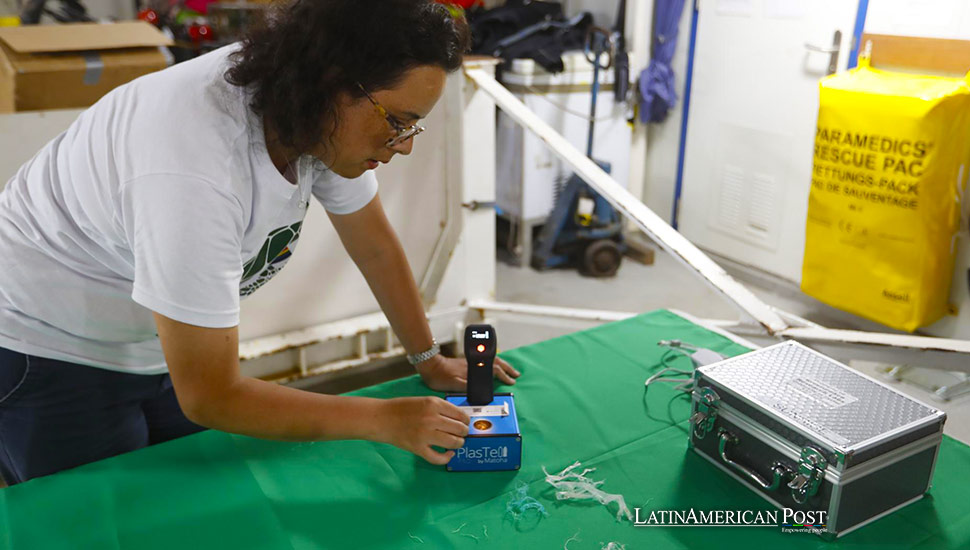Plastics Threaten Malpelo’s Waters in the Colombian Pacific

Greenpeace’s Arctic Sunrise journeyed over 40 hours to Colombia’s Malpelo sanctuary, uncovering alarming plastic pollution and illegal fishing, highlighting urgent environmental challenges in Latin American marine ecosystems.
Greenpeace’s Arctic Sunrise embarked on a significant expedition to Malpelo Island, off Colombia’s Pacific coast, in a poignant revelation of the environmental plight facing Latin America’s marine sanctuaries. After navigating for over 40 hours through waters teeming with dolphins, tunas, and manta rays, the crew confronted a stark reality: the sanctuary’s waters were contaminated with seven types of plastics, and illegal fishing vessels breached its protected realms.
Exposing Plastic Pollution: A Journey of Discovery
This journey, led by a diverse team of environmentalists, scientists, engineers, and photographers, exposed the grim infiltration of plastic waste into these remote waters. Amidst the ocean’s natural inhabitants, they encountered floating “schools” of bottles, bags, diapers, fishing debris, baby bottles, cups, and snack wrappers. The sighting of illegal fishing boats further underscored the sanctuary’s vulnerability to human exploitation.
Tatiana Céspedes, Greenpeace’s campaign coordinator in Colombia, shared her astonishment with EFE, emphasizing the tragedy of finding such waste in the secluded beauty of Malpelo Island, 500 kilometers from the shore. The mission’s unsettling discovery was the presence of microplastics, which were identified using a Manta Net to collect and analyze water samples. An infrared polymer detector revealed that the waters harbored all seven major types of plastics, posing a threat to marine life, including turtles, sharks, and whales.
The Arctic Sunrise’s multinational crew, hailing from 14 different countries, witnessed firsthand the peril plastic waste poses to marine migration routes and ecosystems. This voyage marked the vessel’s inaugural mission to Colombia, aiming to advocate for the protection of the Colombian Pacific, study its marine conditions, and urge the national government to ratify the Global Ocean Treaty, adopted by the United Nations in 2023.
Call to Action
Céspedes highlighted the global nature of Greenpeace’s mission, with its fleet of three ships crewed by international crews. This expedition documented the tangible realities of plastic pollution and illegal fishing in Colombian waters, raising alarms about these pervasive issues.
The Arctic Sunrise, originally named Polarbjørn (Polar Bear), was built in 1975 for seal hunting, an industry Greenpeace vehemently opposed. By 1995, Greenpeace clandestinely purchased and repurposed the vessel for conservation efforts. Colombian freediver Sofía Gómez, who joined the mission, expressed her shock at the ocean’s condition, stressing that maritime care begins at home, far from the sea’s direct visibility.
In collaboration with the National Natural Parks and the Malpelo Foundation, the expedition collected samples for in-depth analysis, aiming to deepen understanding and spur action. The findings serve as a clarion call for urgent measures to safeguard oceanic health and sustainability, urging governments and citizens to rectify detrimental plastic practices.
This venture into the Malpelo sanctuary is more than a local issue; it reflects a continental challenge. With its extensive coastlines and marine biodiversity, Latin America is at a crossroads. Countries like Brazil, Mexico, and Chile, each with unique marine ecosystems, face similar pollution and illegal fishing threats, underscoring the need for regional cooperation and robust environmental governance.
Brazil’s Amazon River mouth and coral reefs, Mexico’s Great Maya Reef, and Chile’s Juan Fernández Islands and Desventuradas are all critical habitats facing the brunt of human-induced pressures. These sites, like Malpelo, are vital for their endemic species and global environmental significance, influencing climate regulation and biodiversity.
Also read: Former Colombian President Uribe to Stand Trial
The Arctic Sunrise’s journey to Malpelo is a microcosm of the broader environmental challenges confronting Latin America’s marine environments. It illustrates the intertwined fates of terrestrial activities and aquatic health, highlighting how inland plastic usage and waste management practices can have far-reaching impacts on distant oceanic sanctuaries.
Greenpeace’s expedition to Malpelo Island is a powerful testament to the environmental crises plaguing Latin America’s oceans. It underscores the urgent need for comprehensive and collective action to combat plastic pollution and illegal fishing, safeguarding the region’s marine treasures for future generations. As the global community moves towards greater environmental awareness, the fate of Latin America’s seas and their diverse life hangs in the balance, calling for a unified stand to protect these precious blue realms from human impact.




